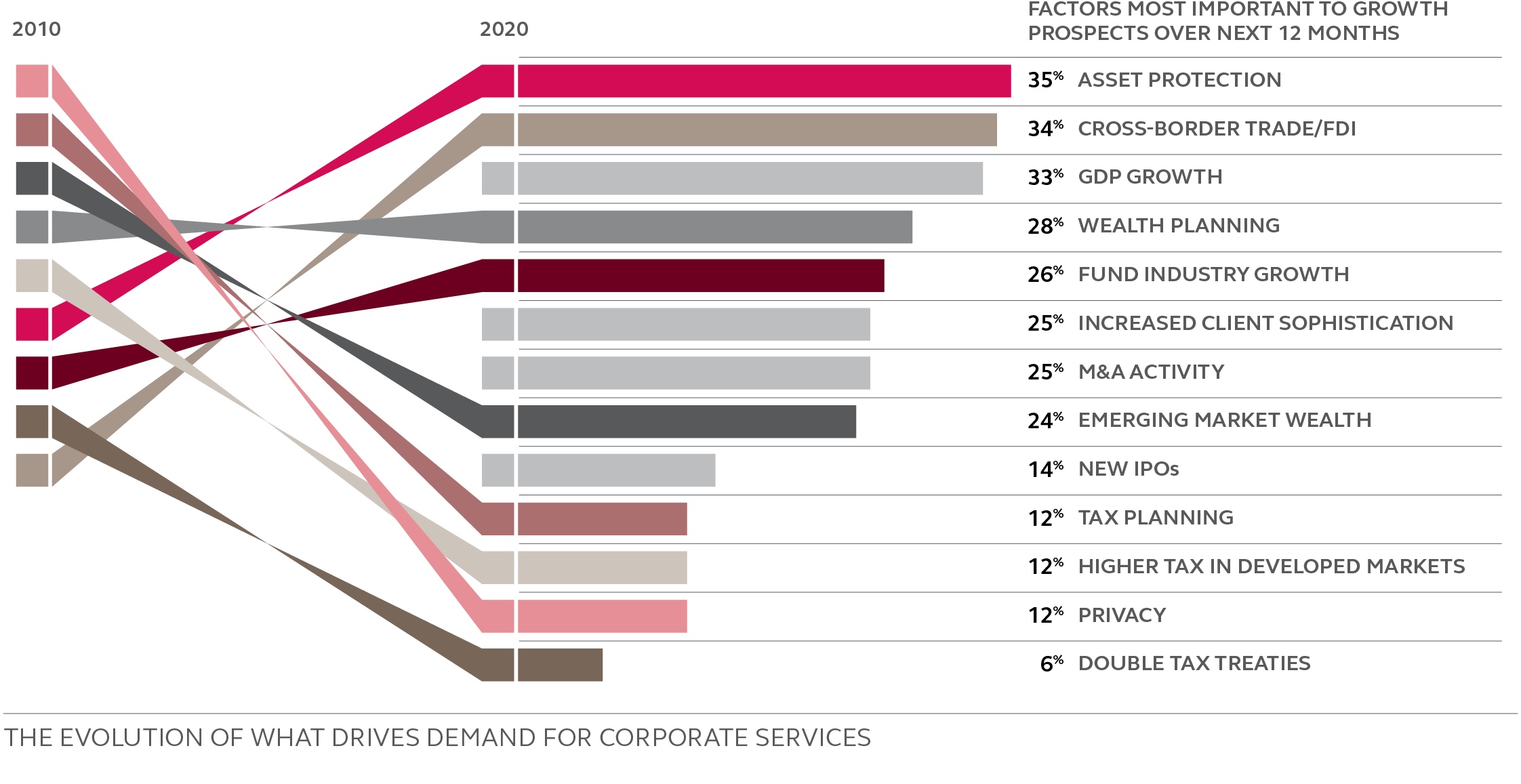A delicate balance: Has the push for transparency in corporate services gone too far?

The erosion of privacy is perhaps the most dramatic transformation to hit the corporate services industry over the past decade. While the industry has come to accept increased information sharing requirements, the wave of tax and transparency initiatives introduced has ensured the corporate services industry is more highly regulated and more open than ever before.
From the OECD’s Common Reporting Standard (CRS) to the Foreign Account Tax Compliance Act (FATCA) in the US, to the EU’s 5th Anti-Money Laundering Directive (AMLD 5), the magnitude of the change is underscored by Vistra’s long-running industry research.
In 2010, Vistra’s survey of corporate services executives found that privacy was a primary driver for the use of corporate vehicles. Today, only 12% of respondents say this; asset protection (35%) and facilitating foreign direct investment (34%) are now cited as the top motivations.

Although the exchange of information between governments has led to better compliance – the OECD estimates that CRS increased tax revenue worldwide by €93billion between 2009-2018 – many in the industry believe that tools such as public registers of beneficial ownership information are a step too far.
Has the push for transparency gone too far?
Three-fifths (57%) of respondents in Vistra’s latest study think public registers are in breach of privacy rights, such as those set out under the EU’s General Data Protection Regulation (EU GDPR).
As cyber crime becomes more sophisticated, there is a growing awareness of the dangers of exposing too much personal data in publicly accessible forums. A study by fraud prevention specialist Cifas found that UK company directors – whose information is made available via Companies House – are twice as likely as the general public to be targeted with identity theft and fraud.
Against this backdrop, public beneficial ownership registers are now coming under fire. Some individuals have already brought legal challenges against the use of public registers in the EU.
In 2016, France's highest administrative court ruled to provisionally suspend its register for violating individual privacy, by requiring that the details of an American trust beneficiary living in the country be disclosed to French tax authorities. And in 2017, the European Court of Justice ruled that limitations to the access of personal data on company registers might apply in certain circumstances.
The EU’s own data protection supervisor published an opinion in 2017, where he described proposals for public access to beneficial ownership information as having “a lack of proportionality, with significant and unnecessary risks for individual rights to privacy and data protection”.
Is the future of public registers hanging in the balance?
It is not just legal uncertainty that is impeding the momentum of these transparency initiatives. The majority of EU member states have dragged their heels on implementation, with only five of 27 having implemented a public register that is free to access by the EU’s deadline of January this year.
Even where implementation progress has been made in Europe, public registers have proven relatively ineffective to date, largely because of limited regulator resources to enforce compliance and to verify that information being submitted is correct and complete.
Elsewhere, the prospects of other major economies following Europe’s lead seem increasingly slim. While 58% of European respondents think that publicly available beneficial ownership information will be a widespread practice globally by 2025, just 37% of our respondents in the US and within Asia-Pacific think the same.
It is unsurprising therefore, that at a global level Vistra’s study suggests that clients’ privacy levels are fading more slowly than anticipated. In 2017, 30% of our respondents predicted that beneficial owners’ privacy would be almost entirely swept away by 2022, yet today only 5% of respondents think we’ve actually arrived at that point. However, the question marks hanging over beneficial ownership registers could see transparency permanently reined back to some degree.
Over the long term, only 20% of industry professionals think public registers will prevail, with 60% favouring the so-called corporate service provider model. Under this model, regulated corporate service providers verify company information and make it available to relevant authorities as required, rather than making all information publicly accessible.
A more considered approach to information sharing will be needed in the decade ahead. Public beneficial ownership registers may well need to be rethought, if an acceptable equilibrium is to be reached between the conflicting principles of privacy and transparency.
Find out more about Vistra 2030 and download the report here
The contents of this article are intended for informational purposes only. The article should not be relied on as legal or other professional advice. Neither Vistra Group Holding S.A. nor any of its group companies, subsidiaries or affiliates accept responsibility for any loss occasioned by actions taken or refrained from as a result of reading or otherwise consuming this article. For details, read our Legal and Regulatory notice at: https://www.vistra.com/notices . Copyright © 2024 by Vistra Group Holdings SA. All Rights Reserved.

